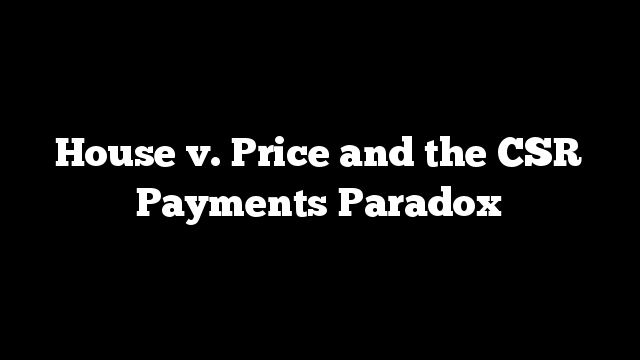 Many countries in the world have dysfunctional governments. Some have corrupt and devious ones, or even deadly ones. We’ve lived with serious dysfunction in Washington for two decades. Now we join the ranks of countries with a corrupt and devious government, one without a moral compass.
Many countries in the world have dysfunctional governments. Some have corrupt and devious ones, or even deadly ones. We’ve lived with serious dysfunction in Washington for two decades. Now we join the ranks of countries with a corrupt and devious government, one without a moral compass.
And I’m not just talking about Trump.
The news and blogosphere is replete with this sentiment surrounding the White House, of course, a la the “Russia thing” and Comey’s firing and all the rest.
But the cynicism and political bankruptcy that suffuses our elected leaders’ failure to assure that the cost-sharing subsidies for people buying health insurance through the exchanges will be secured for 2017 and 2018 is a new low in the wretched ongoing saga of Obamacare vs. Trumpcare.
This is playing out right now and could affect 12 million people come this fall and in 2018.
To be sure, there’s a legal issue that deserves attention. Here’s the quick background if you haven’t been following this closely:
The Republican-led House of Representatives in November 2014, in an unprecedented move, legally challenged the Obama administration’s payment of subsidies to insurers to compensate them for helping people between 100 and 250 percent of the poverty level pay their deductibles and out-of-pocket payments.
The House claimed that Congress never appropriated money to fund these payments; thus the administration was making them unconstitutionally. In May 2016, a judge ruled in the House’s favor, holding that Congress had indeed not specifically appropriated money to cover the “cost sharing reduction” (CSR) payments.
The judge ordered that future payments stopped until Congress specifically appropriated the funds, but then stayed that ruling pending certain appeal. The Obama administration did indeed appeal, in October 2016. The House then requested additional time to file its responsive.
Then came the election and Trump’s win. The House asked the court in February that the appeal be stayed until the new administration took a position. The judge agreed and issued a deadline of May 22, 2017. (See below for what happened on Monday.)
From Jan. 21 through May 22, Trump and administration health officials sent mixed signal after mixed signal on the fate of the lawsuit and the CSR payments, which totaled $7 billion in 2016 and helped 7 million people.
One minute the White House seemed to agree the payments had to continue—while ACA repeal and replace was being debated and legislated—only to undermine that sentiment within days.
In particular, on numerous occasions, Trump said flatly that letting the CSR payments lapse would “kill Obamacare.” He threatened to do just that, by ordering the payments be stopped—something he can do. He also suggested several times that he might use continuation of the CSR subsidies in 2017 as leverage to get the Democrats to support the House Republican health care bill.
And Trump said: Congress can authorize the payments if they want to, though he never indicated (to my knowledge) that he supported that course of action or that he would sign such a law.
Notably, the House’s American Health Care Act (AHCA) would continue the CSR payments through 2019—something Trump seemed not to know. But, as Tim Jost points out in this Health Affairs blog, “the bill provides no additional funding for the program, necessitating continued defense of the appeal to stop the lower court’s order from going into effect prior to that time.”
Virtually every major healthcare lobby group—insurers, physician, hospital and consumer groups—argue that failure to continue the CSR payments will have a dramatic negative impact on the ACA marketplaces in 2018.
Insurers have all but said that premiums will spike even further in 2018 without the payments. The Kaiser Family Foundation put a nationwide average on that increase of 19 percent.
The deadline for states to let the federal government know whether they will participate in the exchanges in 2018 is June 21. That means they are figuring it all out NOW. Several states have already given insurers permission to submit two sets of proposals—one assuming the CSR payments continue and one assuming they don’t.
Fast forward to recent days. Recognizing the dire nature of the situation and the political failure at the federal level, on May 18 attorneys general from 15 states and the District of Columbia filed a motion to “intervene” in the litigation.
Again, courtesy of Tim Jost, that means the states are claiming they have an immediate interest on behalf of their residents to seek a resolution to the litigation. Namely, the states argue that subjecting future CSR payments to an unpredictable appropriations process will lead to higher insurance costs and to more insurers abandoning the individual health insurance market.
The states further assert, according to Jost, a healthcare attorney, that:
“President Trump’s statements demonstrate that the administration cannot adequately represent the states’ interest in the litigation,” and that they, the states, “have a sovereign interest in administering their insurance markets and protecting their residents.”
The National Association of Insurance Commissioners, along with a number of large insurers and major employers, also weighed in to warn Congress and the administration of the danger ahead if the CSR subsidies cease.
On Monday May 22—the deadline for the administration’s decision—this dirty can, filed with political mold and moral decay, got kicked down the road.
The House of Representatives and the Department of Justice jointly sought an appeal court’s permission to preserve the status quo for another 90 days, until August 20.
The court is expected to issue a decision soon. But make no mistake, this leaves states, insurers and millions of exchange customers in a state of deep uncertainty and angst—even if the administration, as reported, agrees to pay the subsidies through August.
The stupidity of all this is exacerbated by the fact that ending the CSR program would actually cost the government more money, as long as the ACA exchange system is in place. That’s because higher premiums translates to higher premium subsidies from the government. Of course, many people would drop out if, as predicted, insurers hiked premiums an average 19 percent in addition to increases planned for other reasons.
The Congressional Budget Office score of the House-passed repeal and replace bill may shed further light on the impact of the CSR payments—or not. The CBO is expected to issue its report this week.
As Jost notes, passing an ACA repeal and replace bill (if the Senate gets its act together) will not resolve all of House vs. Price, as the case is known. Apart from the CSR subsidies, it’s legally murky whether a single chamber of Congress has standing to sue an administration to stop the expenditure of funds that it believes were not properly appropriated.
If our elected officials had any sense at all and were acting in the public interest, the CSR issue would get resolved as soon as possible. The solution is simple: Congress has but to authorize the subsides and appropriate the money. They can and should do that for the remainder of 2017 for starters.
